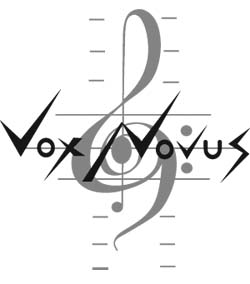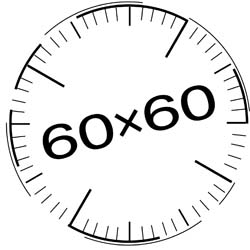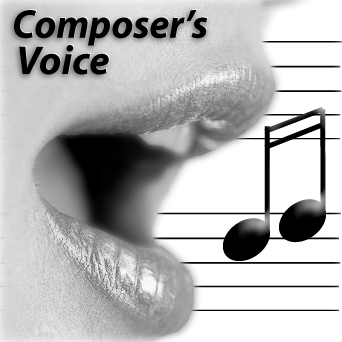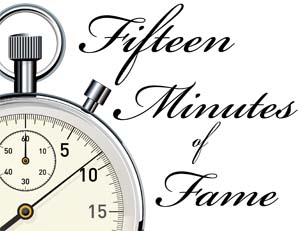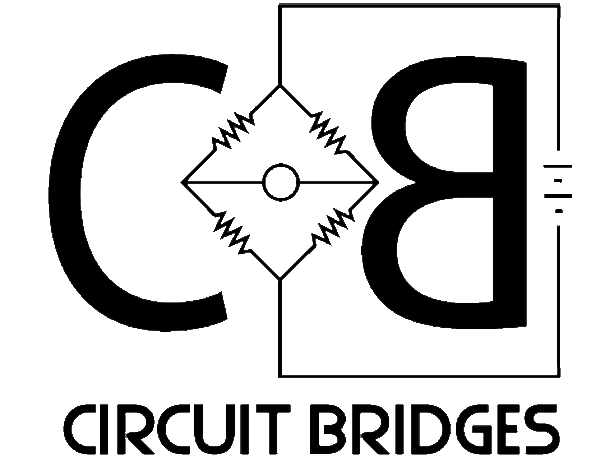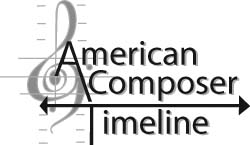| |
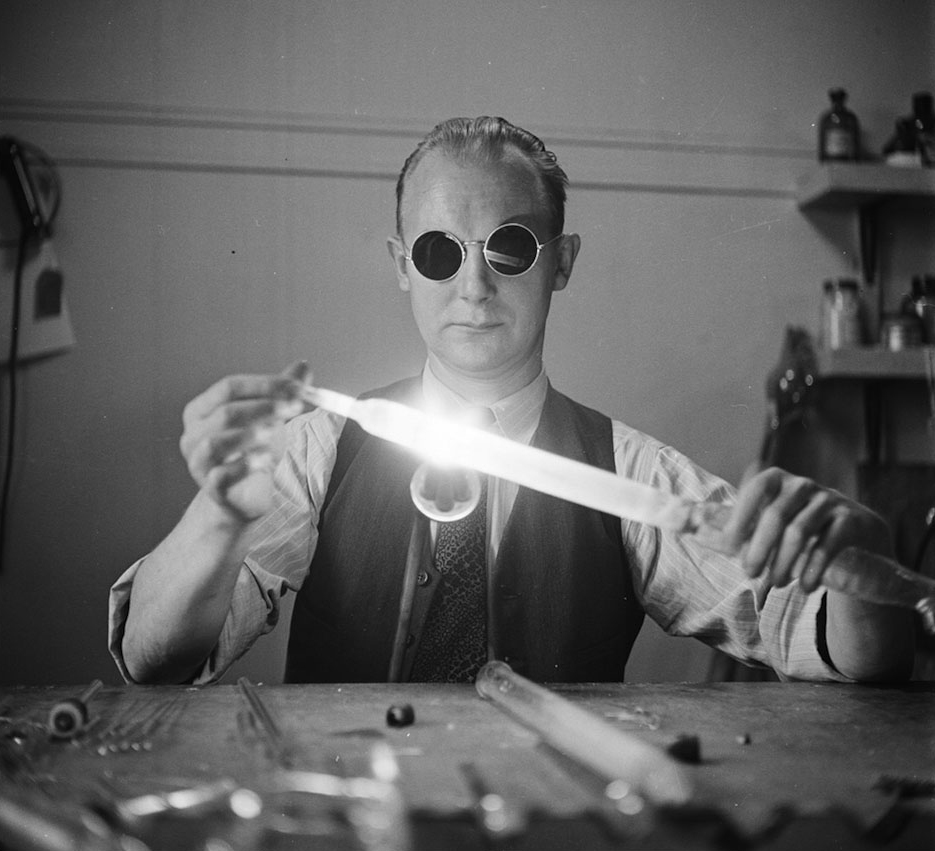
The premiere of Giuseppe Dinklaker’s Etude Bruté was a double-edged sword. Yes, it was a coup for the Bingtown Festival Orchestra to commission the work from such a famous composer—okay, infamous composer, but that’s another story. However, the piece cost so much that orchestra management couldn’t afford to pay the Bingtown Concert Hall’s electric bill, already long past due. Knowing that the utility was unsympathetic to the orchestra’s plight and that the premiere would likely take place in a darkened theater, second bassoonist Brad Pringler, who was a handy guy with a soldering iron, built the illumbaton. Emitting a light much brighter than an ordinary glow stick, the illumaton worked superbly during rehearsal: even the cowbell player buried way back in the percussion session could see Maestro Meptang’s smallest batonical nuance. Alas, at the premiere, a keyed-up conductor began the piece with an overly energetic downbeat, smashing the illumbaton against his music stand. It shattered, spilling its flammable contents of chlorine trifluoride and titanium dichloride (which were highly flammable, really) onto the podium and into Rows A and B. A fire ensued, followed swiftly by pandemonium. Dinklaker liked the added excitement and vowed to add “conflagration” to the score as soon as he escaped the theater. Alas (to repeat that too oft used interjection), he is still in there, though fire officials expect to rescue him any day now.

David Gunn
www.DavidGunn.org
|
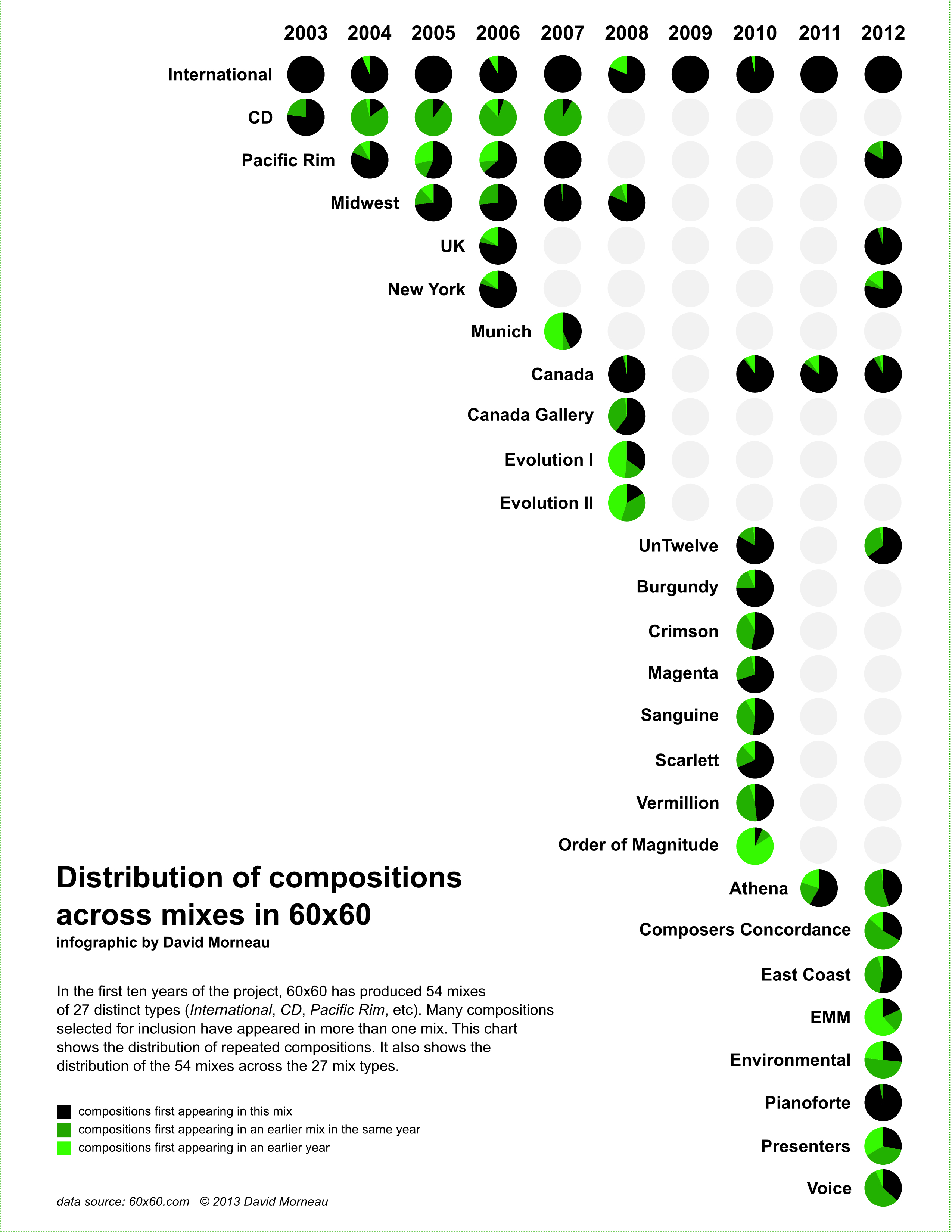
This is my second installment in a series of graphs and analyses that explore the impact of Vox Novus’s projects over the past 15 years.
The first graph, showing an overview of composers submitting to 60x60 can be found here:
http://www.voxnovus.com/NM421/issue/14-08-22.htm#stats
Today’s graph looks at 60x60 in terms of its mixes. In 2007 I submitted “Here, I’ll Play It Again.” It ended up being selected for both the International Mix and the Midwest Mix that year. I was thrilled. Since then, I’ve been curious to know how common it is to be in more than one mix at a time. This week’s graph illuminates the answer.
Each column is for a single year (2003-2012) and each row is for a single mix type (International, CD, etc). Not every one of the 27 mix types was used every year, clearly seen by the lack of a pie chart at the year/mix intersection. Each pie chart is colored to show how much reuse there is in it. Black indicates pieces first appearing in that mix. The two shades of green are for pieces that first appeared in previous mixes—dull green for pieces from the same year, bright green for prior years.
The data was sorted and collated in the same order as the mix types on this chart. The first time a piece appears in a column it is marked as black, subsequent appearances are green. My composition from 2007 is part of the black space in the International Mix and part of the dark green in the Midwest Mix. This piece was also used in the 2012 New York Mix, where it is part of the bright green space.
The choice to indicate the overlap this way (rather than having all appearances of my piece marked green) configures the data in terms of reuse rather than pure overlap. There is no simple way to show which mixes overlap with each other. Some pieces reappear many times over these ten years. Plus almost every mix from 2003-2009 will overlap with the giant Order of Magnitude mix in 2010. The complexity of such a chart would obscure other areas of interest.
There are 27 different types of mixes created in the first ten years of 60x60. There are 54 total mixes from that time. From 2003-2006 the project grew, adding one new mix type each year. After that, new mix types were added as previous types stopped being used. There is also a clear shift away from regionally based mixes toward thematic mixes. The Canada Gallery and the two Evolution mixes (2008) mark this shift.
2010 and 2012 stand out for having many more mixes than the other years in the project—10 and 14 respectively. The one anomaly in the growth curve is 2009, which featured just one mix. When we examine the performance data we will find part of the answer as to why: 2009 was the year with the most 60x60 Dance performances. An in depth exploration of performance data will appear in a future column.
A lot of the later mix types are also one-off mixes. Munich (2007), a thematic mix, is the first of these. All of the red mixes from 2010 were created for ICMC and are not likely to be repeated. The move towards more thematic mixes corresponds with the introduction of guest curators for 60x60 mixes. More curators means more ideas for how to build mixes and more ways to approach themes.
This year there are several guest curators with themed 60x60 calls: Wave Farm’s call for radio works, Sabrina Young’s Latin Mix, Melissa Grey’s Death Mix, Louisiana School for Math, Science, and the Arts Louisiana Mix, and my own BPM (Beat Party Mix). These calls, along with the main 60x60 call, can be found below.
And more information about 60x60 can be found at:
http://www.60x60.com/submission/
60x60 submissions need to be upload to Music Avatar.
http://www.musicavatar.org/
Next time we’ll take a look at how the selected composers are distributed in terms of their participation.
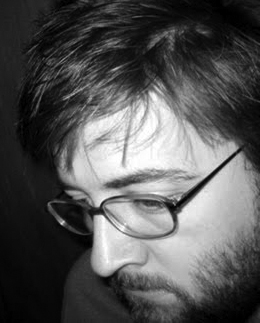
David Morneau
http://5of4.com/
David Morneau is a composer of an entirely undecided genre, a provider of exclusive unprecedented experiments.
|
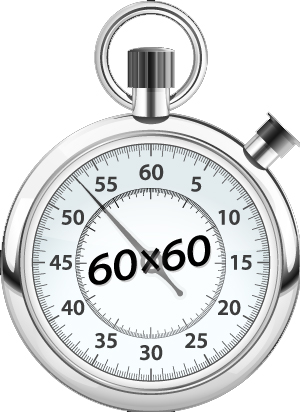
60x60 is calling for one-minute works for its 11th season!
Vox Novus is inviting composers/sound artists to submit recorded works 60 seconds or less in length to be included in its 11th annual 60x60 project. 60 compositions will be selected to be played continuously in a one-hour concert.
60x60 is a one-hour-long show made by sequencing 60 pre-recorded pieces by 60 different composers, each piece a minute in length or shorter. Highlighting the work of a great many composers, 60x60 testifies to the vibrancy of contemporary composition by present a diverse array of styles, aesthetics, and techniques being used today.
60x60 has had more than 350 performances in over 40 countries including venues such as The Winter Garden Atrium in New York City, Stratford Circus in London, The Sheldon in St Louis, Weisman Art Museum, Museum of Contemporary Art in Chicago, and many others.
During the concert each of the 60 pieces selected will begin precisely at the beginning of the minute, this will mark the end of one piece and the beginning of another. There will be no pause between the pieces. Works may be less than 60 seconds in length, but may not exceed 60 seconds. Works selected that are less than 60 seconds long will be "padded" with silence either before, after, or surrounding the composition. Please note that the total duration of the work including silence may NOT exceed sixty seconds.
The 60x60 project's definition of a recorded work is as follows: any work created as a musical composition which is captured on recorded media, which does not require live performers for its production in broadcast at concert halls, radio, multi-media, etc. Its creation can include but not limited to acoustic instruments, voice, environmental sources, and computer (Sampling, MAX MSP, MIDI, C Sound, ProTools, etc.)
All works submitted should be with the understanding that it is their recording that is of prime importance and is what will be used to determine its selection.
60x60 is a project of "signature works" and short works created specifically for the 60x60 project. Excerpts of larger works are strongly discouraged. Works generated from procedures (i.e. mathematical matrices, organizational systems, or computer programs,) remixed works, or themes and motives recomposed from other of the composer's own work are acceptable.
In addition to the 60x60 International Mix, Vox Novus is planning to create several themed mixes including: the Wave Farm mix, the Death Mix mix, Latin American Mix, BPM Mix, Louisiana mix and others. PLEASE NOTE special requirements for themed mixes in order to participate.
60x60 Guidelines
60x60 International mix is open to composers of any nationality, age, or career stage.
The deadline for the 60x60 International mix is November 30, 2014.
There is no admission fee.
All submissions must be uploaded online at: www.MusicAvatar.org
Audio submissions must be in either AIFF or WAV file format.
All submissions must be uploaded by November 30, 2014 on www.MusicAvatar.org
Composers submitting to 60x60 will need to register and upload their works to each specific call for 60x60.
Composers may submit to more than one 60x60 mix
60x60 Latin American Mix
The call is open to all Composers living in Latin America, Composers of Latin American heritage, and/or works that are clearly inspired by Latin American culture/music.
60x60 Wave Farm Mix
Vox Novus's 60x60 and Wave Farm are calling for one-minute radio art works.
Due to the nature of radio to be considered for the 60x60 Wave Farm Mix works must be exactly 60 seconds in length. Works shorter than 60 seconds or longer than 60 seconds will not be considered for this mix
Composers selected for the 60x60 Wave Farm Mix must agree to an FM broadcast on Wave Farm’s WGXC 90.7-FM; and be distributed as a Wave Farm Dispatch Series download.
60x60 Louisiana Mix
The 60x60 Louisiana Mix is for artists born in, working in, educated in or with other connections to Louisiana are encouraged to submit;
We also encourage music written in or influenced by Louisiana music styles and/or musicians; e.g. jazz, zydeco, cajun, mardi gras, swamp rock
60x60 BPM Mix
We are creating a special 60x60 mix that features beat-based music in all electronic styles—EDM, hip-hop, minimalist grooves, underground, and anything else with a beat. 60 works will be selected and ordered in a continuous one hour party mix, to be premiered in NYC in 2015.
Special conditions for the 60x60 BPM (beat party mix)
This mix will be a seamless, gapless experience—much like a DJ mixing at a party. All submissions must be exactly 60 seconds to accommodate this goal. Works shorter than 60 seconds or longer than 60 seconds will not be considered for this mix.
Please indicate the tempo of your track (in bpm) in the "Performance Requirements" field.
Works selected for the 2014 60x60 project will be announced on the Vox Novus newsletter NM421: www.NM421.com
Composer will be notified of the results by email or they can visit: http://www.60x60.com
Questions about 60x60 can be sent to support@voxnovus.com
|
|
|
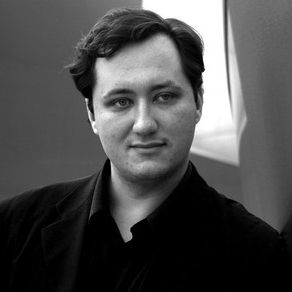
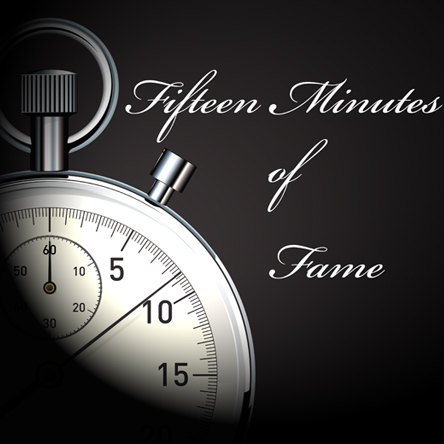
Friday, September 5, 2014 7:00PM
Fifteen-Minutes-of-Fame: Homage to BACH II-Maksim Velichkin, cello
Friday, September 5th, 7:00pm cellist Maksim Velichkin will perform Fiteen Minutes of Fame at the Brand Library & Art Center, 1601 West Mountain Street, Glendale, California
Fifteen-Minutes-of-Fame: Homage to BACH II with cellist Maksim Velichkin is 15 one-minute works by 15 composers:
Martha Bishop, Jim Dalton, Bobby DeLisle, Michelle M. Dewhirst, Rolando Gori, Vera Ivanova, Charles Knox, Arkady Luxemburg, David Meckler, Vasilis Mouskouris, Hinse Mutter, Nathan Nau, Akmal Parwez, Fabio Monzù Rosselli, and Phil Taylor
The theme of this Fifteen Minutes of Fame, an Homage to Bach; are works be based on, developed from, and otherwise related to the pitches BACH. Serving as a uniting factor for all 15 compositions.
Maksim Velichkin has been active as a solo performer, chamber and orchestra musician, both locally and throughout the world. Mr.Velichkin has appeared as a soloist with Uzbekistan National Symphony, Duquesne Contemporary Ensemble, American Youth Symphony, as well as Torrance, Westchester, Southeast and Bellflower orchestras. He has toured extensively to Europe, Asia, North and South America and Australia with the prestigious Verbier Chamber and Verbier Festival Symphony Orchestras. Cellist Maksim Velichkin, violinists Jackie Suzuki and Adriana Zoppo will be performing. Mr. Velichkin will be premiering a second Fifteen-Minutes-of-Fame Homage to Bach set with 15 new composers (the first set was premiered at Brand Library on May 4). Also music by George N. Gianopoulos, Elliott Goldkind, Blair Whittington and more!
Fifteen-Minutes-of-Fame: Homage to BACH II with cellist Maksim Velichkin
Friday, September 5, 2014 at 7:00 PM
Brand Library & Art Center
1601 West Mountain Street
Glendale, California
FREE ADMISSION
|
|
|

|
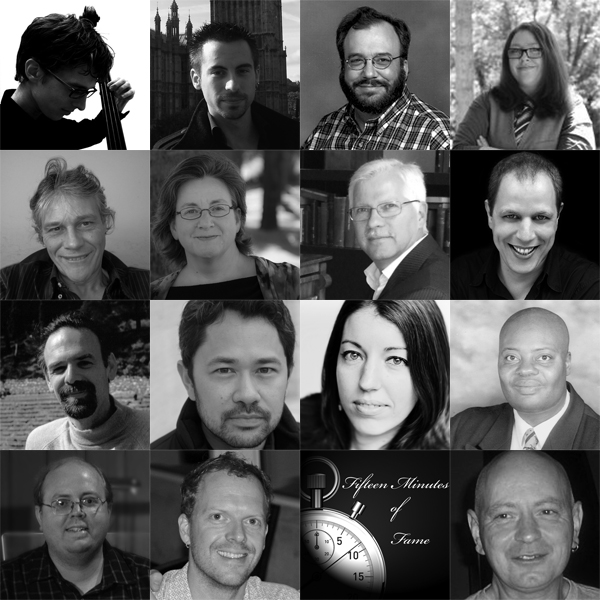
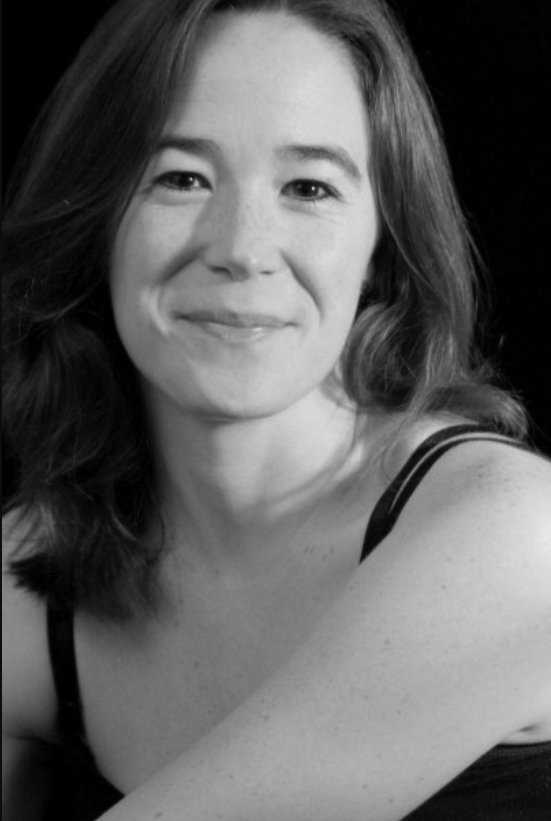
Mary Hubbell, described in the New York Times as “a soprano with a sweetly focused tone,” holds degrees from Boston College; the University of California, Santa Barbara; and the Royal Conservatory in The Hague.
She is active in a wide range of music, from early music to contemporary repertoire. In the Netherlands, she was a frequent soloist with La Prunelle Ensemble, Praetorius Blokfluit Ensemble, and the Netherland Vocal Laboratory. She also participated in the Steve Reich Festival at the Royal Conservatory, the Young Composer’s Festival in Apeldoorn, the Chamber Opera Festival in Zwolle, and the Gaudeamus Festival in Amsterdam. Orchestral engagements have included Louis Andriessen’s Tao with the Royal Concertgebouw Orchestra, Robert Kapilow’s Green Eggs and Ham with the Charleston Symphony Orchestra, Mozart’s Exsultate, jubilate with the Beaufort Symphony Orchestra, Vivaldi’s Beatus vir with the Chorale Society of the Hamptons, and Schubert’s Mass in G with Musica Viva of New York. As a recitalist, she has concertized in Boston, New York, North Carolina, and South Carolina, including Piccolo Spoleto’s Spotlight Series in Charleston. In New York, she has appeared as a soloist with the Manhattan Chamber Orchestra, the Transfiguration Early Instrument Ensemble, Alphabet Soup Productions, The Remarkable Theatre Brigade, and Dr. Faustus. She is pursuing a Doctorate of Musical Arts at the Graduate Center of the City University of New York and is a faculty member of the Brooklyn Conservatory of Music and Smith College. Further information can be found at maryhubbell.com.
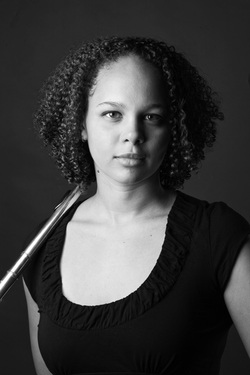
Raised in Austin, TX, flutist Alice Jones is known for giving performances that are “lively” (New York Times), “delicate and passionate with beautiful articulation and dynamics” (Eleanor Cory, composer). An avid symphonic, chamber, theater, and contemporary musician, with performances ranging from the Brandenburg Concerti to New York City’s Look and Listen Festival, Alice was praised by Mario Davidovsky as “the flute player who could really play.” She has been featured as both a soloist and as a chamber musician at the Composers Now! Festival at Symphony Space (2010 and 2011), the Norfolk Chamber Music Festival (2010), and Chamber Music Campania in Italy (2013). She toured China and Hong Kong (2007 and 2008) as a performer and director of chamber music and outreach programs for the Yale-China Music Exchange.
Alice is committed to premiering new chamber music repertoire and has received commissions from the Long Island Composers Alliance with percussionist Cesare Papetti and premiered works by Gregory Brown, Eric Nathan, and Inés Thiebaut with soprano Mary Hubbell.
Demonstrating her equal passion towards performing, research, and teaching, Alice won the baroque concerto competition at SUNY Purchase, was an invited participant in the 2012 National Flute Association Young Artist Competition, received the Brookshire award for musicological research and writing at SUNY Purchase, and received the Associated Music Teachers League Award at CUNY Queens.
Alice graduated from Yale University and SUNY Purchase and is currently a doctoral student at the CUNY Graduate Center. She maintains a private studio in New York and joined the faculty at the Aaron Copland School of Music at Queens College in 2010.
Vox Novus is called for one-minute pieces composed for
Fifteen-Minutes-of-Fame: Aurae – the Belle Époque to be performed at the November 23, 2014 Composer's Voice concert in New York City. These one-minute pieces will be performed by Mary Hubbell (soprano) and Alice Jones (flute)
Theme:
This Fifteen-Minutes-of-Fame composed for Aurae is inspired by the Belle Époque and should reflect that period (http://en.wikipedia.org/wiki/Belle_%C3%89poque).
The Belle Époque was a period in French and Belgian history that is conventionally dated as starting in 1871 and ending when World War I began in 1914. Occurring during the era of the Third French Republic (beginning 1870), it was a period characterized by optimism, peace at home and in Europe, new technology and scientific discoveries. The peace and prosperity in Paris allowed the arts to flourish, and many masterpieces of literature, music, theater, and visual art gained recognition. The Belle Époque was named, in retrospect, when it began to be considered a "golden age" in contrast to the horrors of World War I.
In the newly rich United States, emerging from the Panic of 1873, the comparable epoch was dubbed the Gilded Age. In the United Kingdom, the Belle Époque overlapped with the late Victorian era and the Edwardian era. In Germany, the Belle Époque coincided with the reign of Kaiser Wilhelm II and in Russia with the reigns of Alexander III and Nicholas II.
Works selected for this Fifteen Minutes of Fame include:
Départ by Andrew Haile Austin ,
Resemblances from an Era by Rodrigo Baggio,
Tableau Parisien by Jean-Patrick Besingrand,
Un Grand Sommeil Noir by David Bohn,
Valse vocale by Paul Cowell,
Chou-Fleur à la M... by Damon Lee,
Mondschein by Carrie Magin,
After Monet's Haystacks at Giverny, 1890 by Traci Mendel,
Désordre Lumineux by Hinse Mutter,
To a Creolean Lady by Gary Powell Nash,
Fairy Lights by Angelina Panozzo,
Mémoire by Dana Richardson,
Hotels by .Fabio Monzù Rosselli,
Coeur qui as tant battu by Louis Sauter, and
Time Regained by Christopher M. Wicks
You can find more information here
http://www.Fifteen-Minutes-of-Fame.com/featuring/Aurae/
|
|
|
|

Music Avatar is a great new way to upload works for composer opportunities hassle free! You will be able to submit, update, and modify your submission all the way up to the deadline date of the opportunity.
www.MusicAvatar.org
|
|











